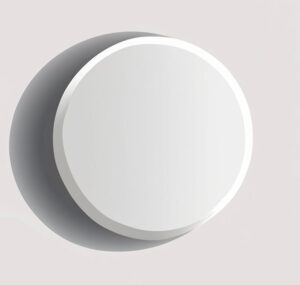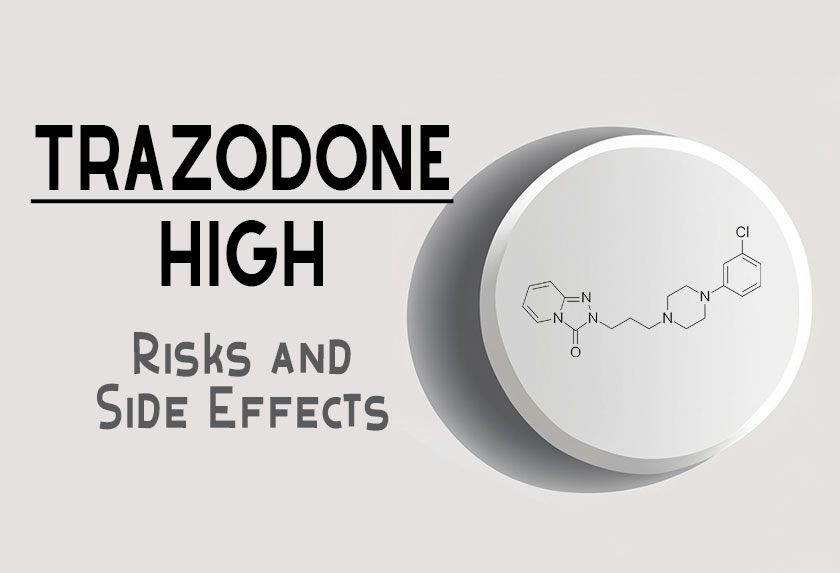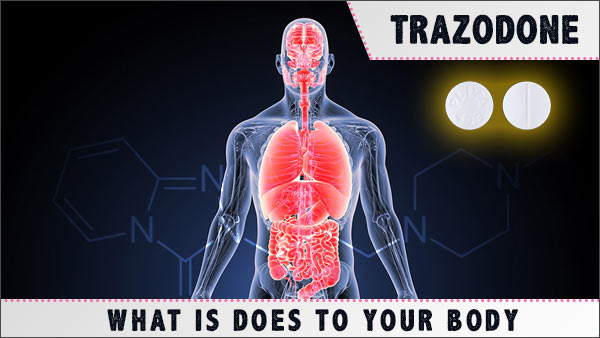Like all medications, Trazodone can be helpful for certain conditions but can also be open to abuse. It may not be the first drug that comes to mind when you think of drug misuse, but a Trazodone High can be just as potent as any other.
It’s a relatively common misconception to associate drug abuse and the addictive pursuit of a “high” to street drugs such as cocaine, crack, heroin, or alcohol. But contrary to assumptions, there’s more to drug abuse/misuse than hard drugs—case in point, prescription drugs.
According to a 2017 survey by the Substance Abuse and Mental Health Services Administration (SAMHSA), prescription stimulants, CNS depressants, and opioids pose a serious public health concern. The findings showed that 18 million people above the age of 12 reported misuse of prescription drugs at least once within the past year. One such drug is Trazodone—a medication prescribed for the treatment of depression.
In an effort to help raise awareness on the risk posed by the misuse of prescription drugs, this article covers everything you need to know about a Trazodone high—including interactions with other substances, FDA warnings, side effects, dosage, and everything in between.
What Is Trazodone?
Trazodone is an atypical antidepressant primarily used to treat major depressive disorder. It acts by inhibiting the reuptake of serotonin and antagonizing certain serotonin receptors.
Trazodone 50 mg is not a narcotic medication. Trazodone is an antidepressant drug that works differently from narcotics. It is not habit-forming or addictive like narcotic painkillers. Trazodone is considered a non-narcotic, non-controlled substance.
Trazodone is arguably one of the cheapest and oldest prescription medications. It was developed over 7 decades ago in Italy as a potential treatment for depression. The pharmaceutical medication is often marketed under the brand names Oleptro and Desyrel.
Trazodone is widely prescribed in the U.S. due to its low risk of dependability (not classified as a controlled substance by the FDA) and the fact that you can purchase a month’s supply for as low as $4. Figures by Statista show that the annual prescriptions of the drug in the U.S. stand at over 20 million.

How does it work as an antidepressant?
There is a neurotransmitter in your brain known as serotonin (aka. the happy chemical) that regulates your mood. When its levels are low, you may experience symptoms of depression and anxiety. In such a case, Trazodone—which is a serotonin antagonist and a reuptake inhibitor (SARI)—is primarily prescribed for help with the depression and other mental health problems associated with low serotonin levels. It basically blocks receptors to hinder the reabsorption of the serotonin—hence facilitating higher levels of the “happy hormone” in your system.
Trazodone for Sleep
As a sedative, Trazodone is known to cause a relaxing or calming effect. For this reason, it’s also prescribed as a sleep aid and it can be used for anxiety and insomnia—but off-label.
One systematic review appearing in Journal of Innovations in Clinical Neuroscience even suggests that the off-label use of the drug for the treatment of insomnia surpasses its originally intended use as an antidepressant. Please keep in mind that it’s best practice to explore behavioral modifications before the prescription of Trazodone.
Is Trazodone Addictive?
Strictly speaking, Trazodone is not considered a habit-forming drug. But like most prescription drugs, it can be addictive and it can cause dependence if abused. While it is not euphoric, it has a calming effect that many people—particularly those with anxiety disorders—can crave.
According to a study published in the Journal of Psychopharmacology, Trazodone has less potential for abuse and addiction than its alternatives such as Halcion and Ambien. Trazodone and other serotonin modulators are often secondary drugs of abuse—meaning they are taken together with other drugs (i.e., co-abused).
Most people who become addicted to Trazodone have first received it by prescription. As people become accustomed to using the drug to help with sleep problems and anxiety attacks, they can build tolerance over the long term—meaning they need to consume a higher dosage to achieve the same level of relaxation as before.
Signs of Trazodone Addiction
If someone is abusing Trazodone or is addicted to the drug, he/she may present the following signs:
- The use of the drug leads to health problems, but the person continues to use it nonetheless.
- Buying Trazodone without a prescription from a medical professional.
- The person neglects personal responsibilities or obligations as a result of abuse.
- Using the drug more often and for longer than prescribed. This also includes using it in a manner that is not consistent with normal usage such as snorting the crushed tablets.
- Spending a significant amount of time sourcing or using the drug.
- Using the medication for reasons other than its intended use.
- People who abuse or are addicted tend to use the drug in potentially harmful situations such as combining it with alcohol and other commonly abused drugs.
- Mental and physical symptoms of withdrawal—indicating some level of dependence on the drug.
If used appropriately, Trazodone can be an effective tool in treating depression, anxiety, and insomnia. However, it should only be taken at the prescribed dose, with food, and should not be taken with alcohol.
Trazodone for sleep is often prescribed in 25mg-100mg doses—depending on the person’s characteristics and brands. But according to studies, lower doses are just as effective and the effects as short-acting—meaning the side effects are fewer and you don’t have to worry about daytime sleepiness.
Owing to the possible drug interactions and the risk of abuse while chasing a Trazodone high, it’s advisable to monitor usage. The general rule of thumb is to consult a health care provider before starting, stopping (gradually weaning off the drug), or changing the Trazodone dosage.
Trazodone Side Effects
Trazodone can have negative side effects, particularly if you’re taking a larger dose than prescribed.
Common Side Effects:
- Headaches and dizziness
- Nausea and vomiting
- Confusion and/or loss of memory
- Sexual dysfunction
- Digestive problems
- Sweating and dry mouth
- Numbness and tingling
- Muscle pain
Long-term side effects:
- Accelerated or irregular heartbeat
- Breathing problems
- Chest pain
- Loss of consciousness, coma or fainting
- Seizures
- Bruising and bleeding
If you use Trazodone—whether as a prescription or for a Trazodone high—and you experience any of the side effects highlighted above, it’s advisable to adopt some coping mechanisms. This may include avoiding heavy machinery, taking plenty of fluids, eating a well-balanced and nutritious diet, and consulting a doctor for medical advice.
Trazodone Interactions
The dangers posed by Trazodone and other antidepressants become more dangerous when they are used in tandem with other drugs such as alcohol. Trazodone interactions can create potentially life-threatening situations, elevate the health risks of existing conditions, and increase the severity of side effects,
If you’re taking Trazodone for sleep problems, you should avoid taking it with other drugs unless your doctor has specifically told you otherwise. Even taking a Trazodone 50mg tablet may bring on negative side effects when mixed with alcohol or other substances. Just as mixing lexapro and weed.
Potential Trazodone interaction—as indicated by the FDA—include warfarin (a blood thinner), phenytoin, digoxin (heart medicine), erythromycin (an antibiotic), clonidine (high blood pressure medicine), carbamazepine, benzodiazepines, antifungal medicines, clarithromycin, other sedatives, and antidepressants, to name a few.
Please Note: Combining Trazodone and another medication that raise serotonin levels may lead to a condition known as serotonin syndrome. It’s characterized by excessively high levels of serotonin in the body—leading to feelings of confusion, restlessness, sweating, agitation, and an increased heart rate.
Long story short, always tell your pharmacist or doctor if you’re using other drugs (prescription and non-prescription) before taking Trazodone.
FDA Warnings
The Food and Drug Administration has added a black box warning for Doctors prescribing and patients using Trazodone. This is the most serious alert that the FDA has and should be taken seriously.
Like many drugs that are used to treat depression, there is a risk in some people of the drug increasing suicidal thoughts and tendencies. This risk is higher in young adults, teenagers and children. If you or anyone you know is experiencing suicidal thoughts, ideation, or attempts, consult a medical professional immediately.
Serotonin syndrome is a life-threatening condition that can occur with Trazodone abuse, particularly if you are new to taking the drug. Symptoms can include agitation, hallucinations, confusion, coordination problems, muscle spasms, high or low blood pressure, fever, vomiting and diarrhea.
If you’re taking Trazodone and are at high risk of developing glaucoma you should speak to your doctor about alternative medications. Also, avoid taking Trazodone with blood thinners such as aspirin and ibuprofen as these reduce your body’s natural blood-clotting abilities.
Treatment
If you suspect the pursuit for a Trazodone high may be responsible for someone’s odd behavior or symptoms, you should seek medical help as soon as possible to avoid long-term repercussions.
Treatment for Trazodone addiction starts with identifying the context of the abuse/misuse problem and a comprehensive assessment of the individual. Depending on the development of the addiction, the treatment program may include medical detox, inpatient/outpatient care, and treatment for co-occurring disorders.
FAQs
What does trazodone do to you?
Trazodone is primarily used as an antidepressant medication. It works by affecting the levels of serotonin, a neurotransmitter in the brain, which helps regulate mood. Trazodone is known for its sedative properties and is sometimes prescribed off-label to treat insomnia due to its potential to induce drowsiness.
Is trazodone the same as Xanax?
No, trazodone is not the same as Xanax. Trazodone is an antidepressant medication that primarily affects serotonin levels in the brain and is also used as a sleep aid. Xanax, on the other hand, is a benzodiazepine medication used to treat anxiety and panic disorders. While both medications can have sedative effects, they belong to different drug classes and have different mechanisms of action.
Is trazodone like a sleeping pill?
Trazodone is sometimes used as a sleeping aid due to its sedative effects. It can help individuals with insomnia by promoting drowsiness and aiding in falling asleep. However, unlike some traditional sleeping pills, trazodone is primarily an antidepressant with additional anxiolytic (anxiety-reducing) effects.
Is trazodone 50 mg a narcotic?
No, trazodone is not classified as a narcotic. It is an atypical antidepressant medication that affects serotonin levels in the brain. Trazodone is not an opioid or a narcotic substance. It’s important to note that while trazodone is not a narcotic, it is a prescription medication and should be taken under the guidance of a healthcare professional.














